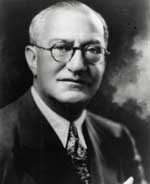

| Barney Balaban | Louis B. Mayer |
| James F. Byrnes | Dore Schary |
| Harry Cohn | "General" Nicholas Schenck |
| William Goetz | Mendel Silberberg |
| Samuel Goldwyn | Spyros Skouras |
| Eric Johnston | "Major" Albert Warner |

It might be noted that Nicholas and Joseph Schenck, like many brothers (the last name is pronounced skenk, not shenk) were two completely different sides of the same tarnished coin. Both came out of the amusement park business where their success drew the attention of entertainment entrepreneur Marcus Loew, with whom they built the Palisades Amusement Park on the Hudson River (their security officer was a young Eddie Mannix, later MGM studio chief. They had to hire Mannix at the park; he and his gang of hoods were stealing too much not to). When Loew went into the film business, be brought along Nick and his older brother, Joe -- Nick to run the company, Joe to run the theaters. Joe eventually left Loew to make movies (first at UA, then at 20th Century-Fox), but Nick's loyalty was rewarded with the presidency of Loew's, Incorporated.
Joe was the one whom people liked; Nick was they one they respected. Nick was a strategist, for on Loew's death it was he who kept the company together, steering Loew's own sons into posts as underlings, and setting his sights on running both the theaters and the company's film production arm, MGM. But he needed money.
Typically, Schenck sought it near the fringes of the law: he asked William Fox, a theater owner who had expanded as rapidly as Loew, to bankroll the merger of Fox's and Loew's holdings. When Louis B. Mayer, the head of MGM, got wind of the deal -- and knew he would be forced out -- he went to the Hoover administration and got the Justice Department to scare Fox off. Schenck had to allow Mayer his fiefdom, but as head of Loew's he constantly kept his old adversary in check. And when Howard Hughes fired Dore Schary when he brought RKO in 1948, Schenck hit upon the idea of appointing Schary over Mayer at MGM, further humiliating L.B. while leaving Schary no doubt about how tenuous his job was, too.
Nick Schenck, like Kirk Kerkorian after him, ran MGM with great power and little personal publicity. When asked, in later years, by a Senate committee whether he was "it" at Loew's, Schenck used the third person to answer, "Mr. Schenck and the board of directors are responsible for it all; there is no doubt about that."
Money is the trail Nick Schenck followed to the Waldorf; MGM's profits were falling and, much as he wanted to blame Mayer, the public pressure against the most visible of Hollywood's studios was also a factor. Two days before the Waldorf conference Schenck had called Eric Johnston; Johnston was in Chicago en route home to New York from a family visit to Spokane, Washington and Schenck reached him between planes. Schenck was in a panic about the HUAC hearings and demanded Johnston do something.
A 1939 puff piece on Fortune magazine noted the anti-trust action then just underway, as well as Schenck's lack of concern over it. The article surmises that, if Schenck had to divest of either theaters or the studio, he would jettison the theaters and stick with films. Movies and racehorses, it seems, were two of Nick Schenck's three main loves. The other, he once listed on a biographical form, is his family.